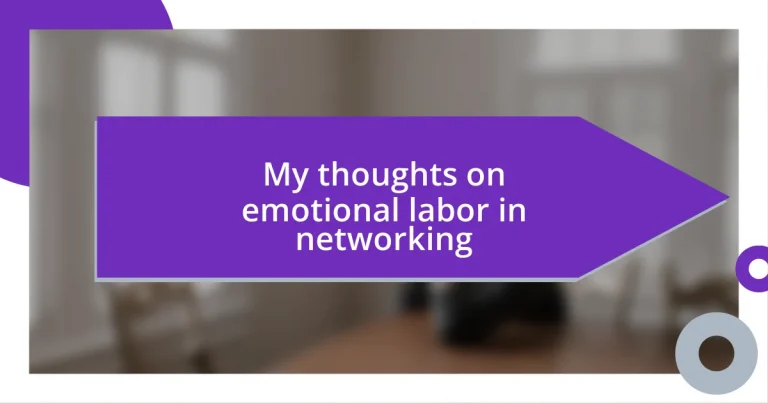Key takeaways:
- Emotional labor in networking often involves managing one’s emotional expressions to create desired impressions, leading to mental fatigue and questioning the authenticity of connections made.
- Emotional intelligence is crucial for effective networking, enabling individuals to empathize, adapt, and foster genuine connections, enhancing overall communication and trust.
- To build genuine relationships, it’s important to be authentic, show true interest in others, and embrace vulnerability, transforming superficial encounters into meaningful bonds.
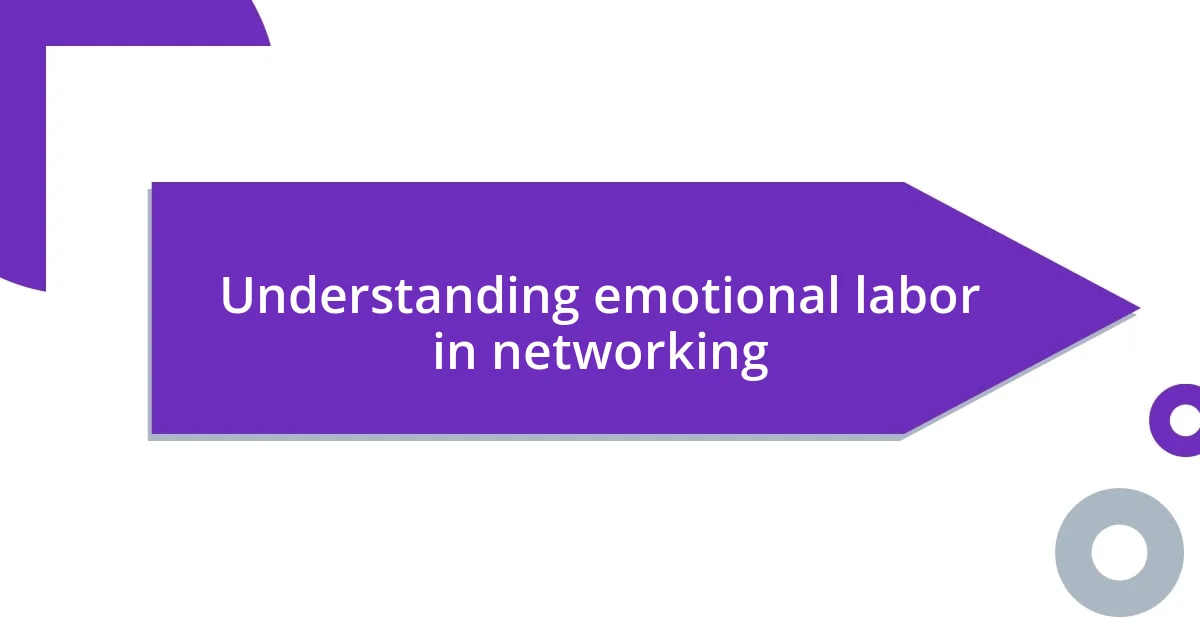
Understanding emotional labor in networking
Emotional labor in networking often manifests as the effort to manage one’s emotional expressions to create a desired impression. Reflecting on my own networking experiences, I remember walking into a room filled with professionals. The pressure to put on a warm smile while my insides churned with nerves highlighted how exhausting it can be to maintain that façade. Have you ever felt that tension between authenticity and the expectations of those around you?
It’s fascinating to think about how emotional labor creates an invisible weight. Each interaction requires us to gauge not just what we say but how we say it—balancing vulnerability with professionalism. I’ve had moments where I’ve had to suppress my true feelings to align with the group’s energy, making me wonder: at what cost does this emotional management come? It’s like performing a well-rehearsed play, where any slip could derail the carefully constructed scene.
Moreover, this dynamic can profoundly affect our mental health. After an intense networking event, I often find myself drained, questioning whether the connections made were genuine or simply a product of emotional labor. Why do we feel compelled to mold our emotions for the sake of networking? Understanding this need is crucial, as it helps acknowledge the personal sacrifices involved in building professional relationships.
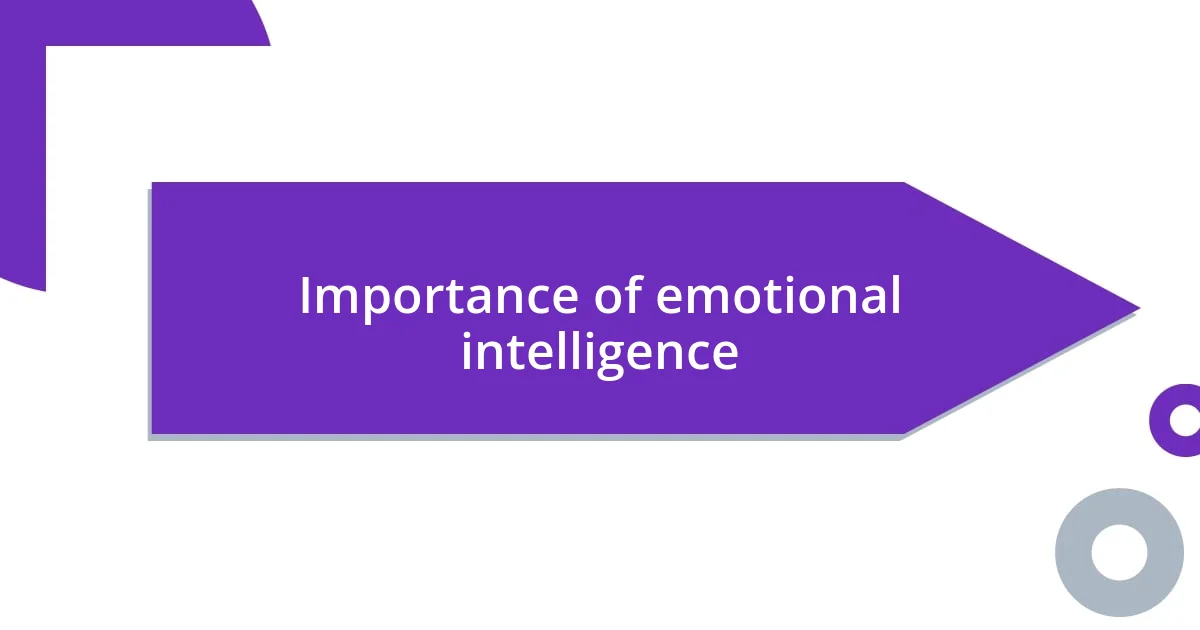
Importance of emotional intelligence
Emotional intelligence plays a pivotal role in effective networking. From my perspective, it allows individuals to navigate complex social situations with ease, adapting emotions to foster connections. For instance, during a recent networking event, I genuinely felt the atmosphere shift when I was able to read someone’s discomfort. My choice to lighten the mood with humor not only eased their tension but also created a more authentic connection.
Moreover, having a strong sense of emotional intelligence makes it easier to empathize with others. I find that when I can truly understand what someone is feeling, I can respond in a way that builds trust. For example, I remember meeting a fellow professional who seemed hesitant to share their ideas. By acknowledging their feelings and encouraging them with affirmations, I saw them visibly relax and engage in the conversation more freely.
In essence, emotional intelligence isn’t just a soft skill; it’s a crucial element that can make or break networking experiences. Through my own journey, I’ve learned that harnessing this skill helps to deepen relationships and enhance communication. When I approach networking with empathy and awareness, I consistently find that the connections formed are not only more meaningful but also more fulfilling.
| High Emotional Intelligence | Low Emotional Intelligence |
|---|---|
| Fosters genuine connections | Creates disconnect |
| Promotes understanding and empathy | Leads to misunderstandings |
| Encourages open communication | Results in superficial interactions |
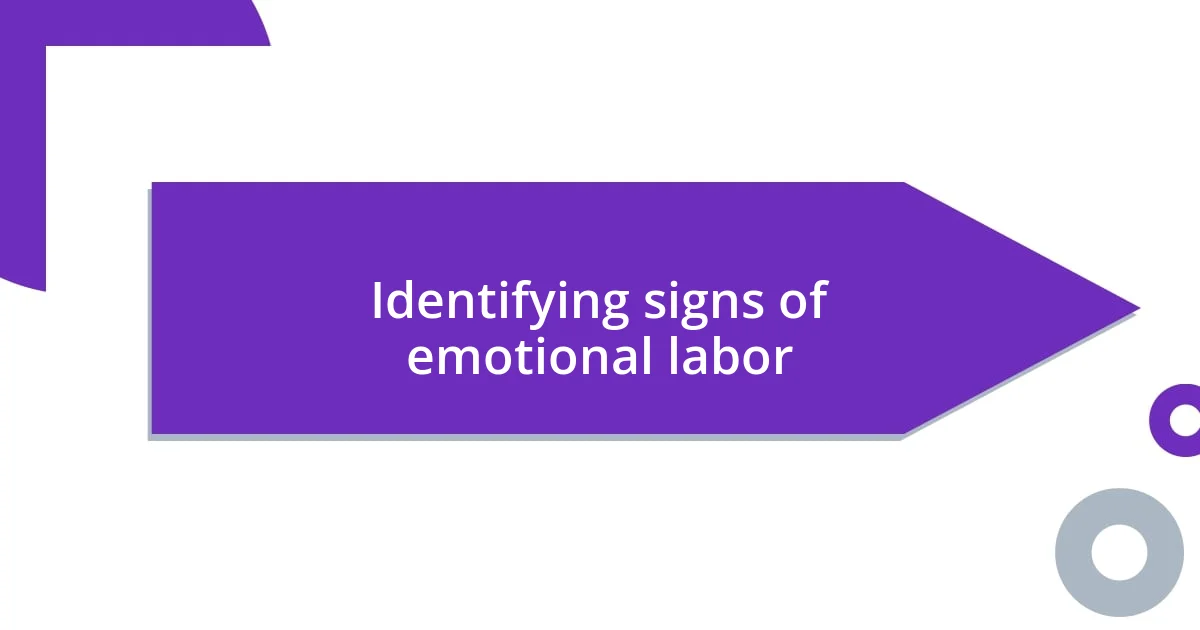
Identifying signs of emotional labor
Recognizing signs of emotional labor in networking can be subtle yet insightful. I’ve often found myself feeling an inexplicable heaviness after a long event, realizing that I’ve been suppressing genuine reactions while trying to fit in. It’s exhausting to smile and nod when inside I’m feeling overwhelmed or disconnected. If you’ve ever felt that your energy was sapped by simply maintaining a cheerful demeanor, you might be experiencing emotional labor.
Here are some common signs to look for:
– Physical Symptoms: A tight jaw or tense shoulders can indicate stress from managing emotional presentations.
– Fatigue: Feeling drained after social interactions, even if there were no significant conflicts.
– Cognitive Dissonance: Experiencing a disconnect between how you’re expected to feel and your true emotions.
– Emotional Burden: A lingering sense of anxiety or frustration that comes from overexerting emotional effort.
– Withdrawal: A desire to retreat from social situations to recharge, indicating the toll of emotional management.
It’s essential to listen to those feelings. I recall a particularly challenging networking dinner where I was in constant performance mode, and by the time I got home, all I could do was collapse into bed. The experience reminded me how important it is to honor my emotional needs while building connections. Being aware of these signs doesn’t just improve our networking skills; it also encourages a healthier approach to relationships.
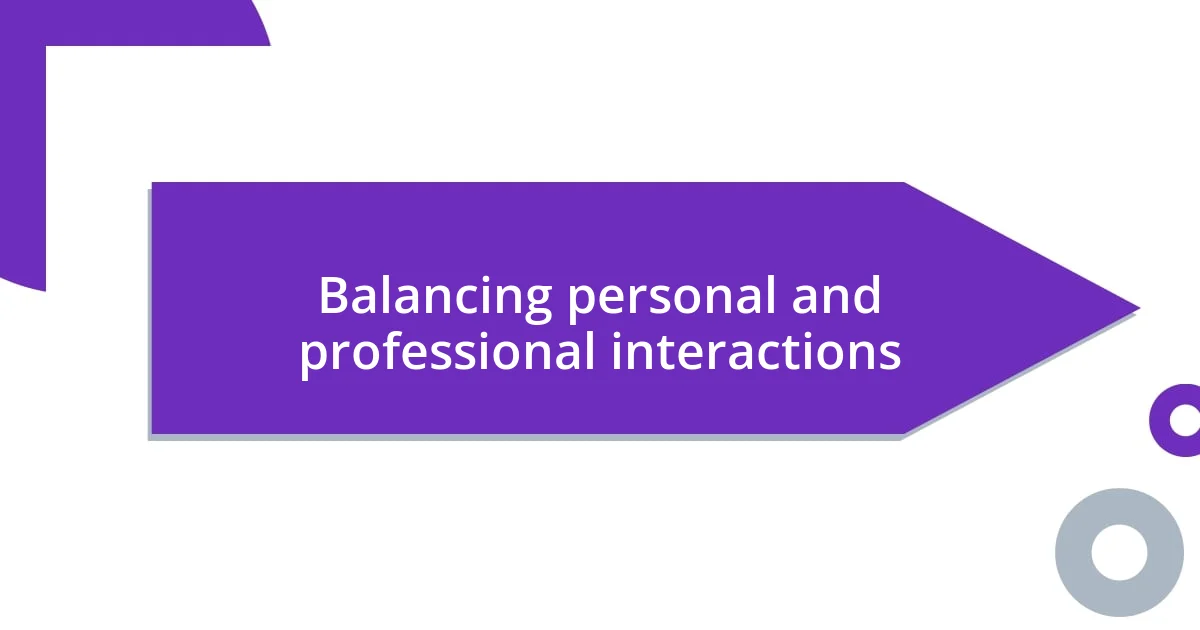
Balancing personal and professional interactions
Navigating the delicate line between personal and professional interactions can be quite a challenge. I’ve often encountered situations where I felt compelled to keep my personal emotions tucked away while trying to maintain a professional facade, especially in a work networking event. For instance, I once chatted with a potential business partner who seemed very focused and serious. As I mirrored that energy, I later wondered: Was I missing an opportunity for a more authentic connection?
What I’ve discovered is that infusing some personal touches can humanize those interactions. During a particularly stiff meeting, I shared a light-hearted story about my pet, which transformed the mood and encouraged others to open up. It’s fascinating how a simple personal anecdote can bridge the professional gap, isn’t it? I’ve learned that balancing these aspects fosters a more relaxed atmosphere, allowing genuine connections to flourish.
However, it’s crucial to recognize when to shift between these two realms. In my experience, I’ve felt a tension arise when I overly shared personal matters within a professional context. Once, I realized mid-conversation that I had divulged too much about my life, making the listener visibly uncomfortable. This moment taught me that while being open can be beneficial, maintaining professional boundaries is essential to cultivate respect and trust. Balancing these interactions is about finding that perfect middle ground, where authenticity and professionalism can co-exist seamlessly.

Strategies for effective networking
One effective strategy for networking is to embrace active listening. I remember attending a seminar where, during a breakout session, I focused intently on what the speakers were saying instead of preparing my own next response. This not only made the speakers feel heard but also deepened my understanding of their perspectives. Have you ever noticed how people light up when they feel genuinely valued in a conversation? Active listening fosters trust and opens doors to meaningful relationships.
Another approach is to set specific networking goals for each interaction. For instance, I often walk into events with a clear intention, like wanting to learn about someone’s career journey or seeking advice on a particular challenge. This strategy not only focuses my conversations but also helps me manage the emotional labor involved. Have you ever felt lost in a sea of small talk? With clear goals, you can steer the discussion towards more engaging topics that resonate with your interests.
Additionally, follow-ups are crucial for lasting connections. After I exchange contact information with someone, I make it a point to send a personalized message within a day or two. I’ve found that referencing something specific from our conversation not only reinforces our connection but also shows that I genuinely care. It makes me wonder, how often do we lose touch simply because we neglect that follow-up? Taking that small step can solidify professional ties while minimizing the emotional drain that comes from starting over with new acquaintances.
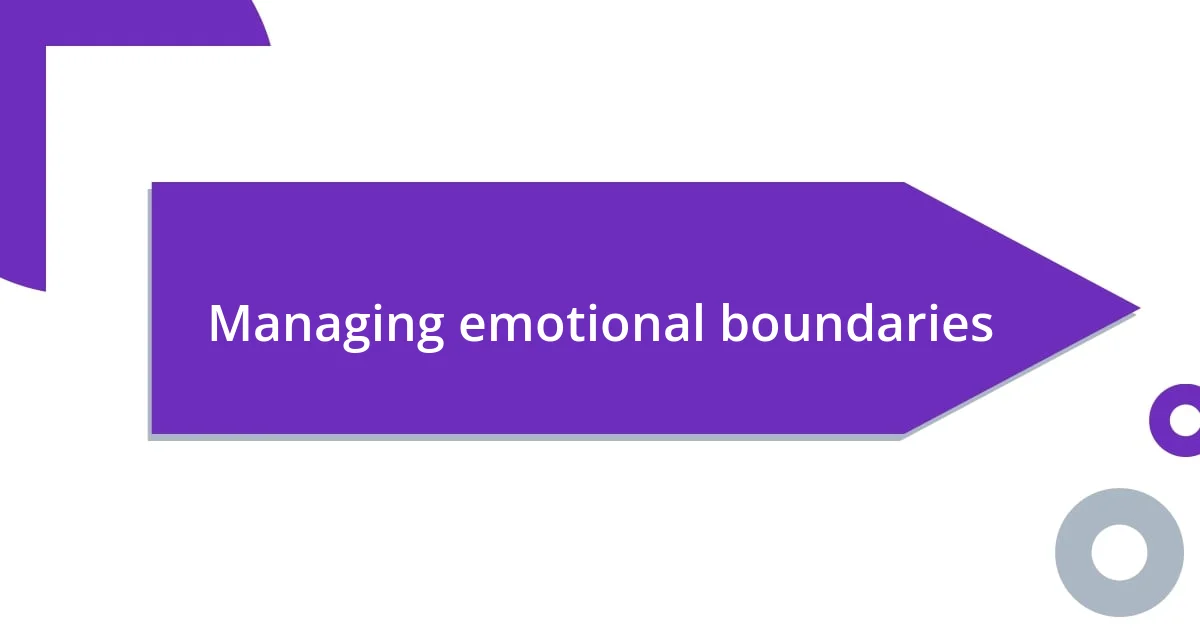
Managing emotional boundaries
When it comes to managing emotional boundaries, I often find myself reflecting on the fine balance between empathy and self-preservation. Recently, during a networking event, I spoke with someone who was going through a tough time at work. While I wanted to offer support, I had to consciously remind myself not to absorb their emotional weight. Have you ever felt drained after trying to help someone, only to realize you were emotionally overexposed? It’s a delicate dance, requiring you to listen and empathize while also safeguarding your own emotional well-being.
I’ve learned that setting clear limits can make a huge difference. For instance, after a particularly intense conference call, I took a moment to breathe and mentally detach from the stress of the conversation. This small act served as a reset, reminding me that it’s okay to step back and recharge. How do you recharge after emotionally taxing interactions? I’ve found that allowing myself a bit of downtime can enhance my focus and productivity, enabling me to engage authentically without feeling overwhelmed.
Moreover, I find it invaluable to communicate my boundaries clearly to others. In a recent situation, I had to politely decline a request for an in-depth discussion on a heavy issue after the main event. I gently explained that I preferred to keep our conversation light and focused on networking. It felt liberating to prioritize my emotional safety. By expressing my limits upfront, I created space for more enjoyable exchanges without feeling guilty about drawing a line. Isn’t it freeing to assert your needs while still being approachable?
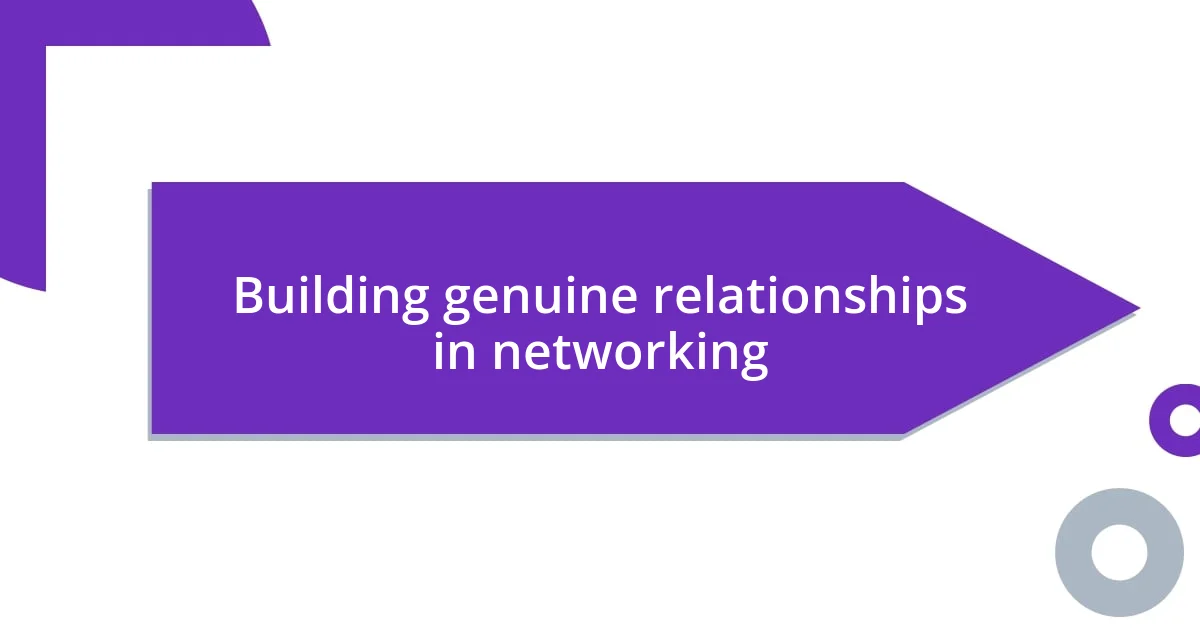
Building genuine relationships in networking
Building genuine relationships in networking often starts with being authentic and showing true interest in others. I recall a time when I met someone at a conference who shared my passion for graphic design. Instead of simply discussing our work, I asked about the personal stories behind their projects, and their eyes lit up. Have you ever felt that thrill when someone takes a genuine interest in your journey? These authentic conversations not only build trust but also lay the foundation for a meaningful connection.
It’s also essential to follow your instincts about who resonates with you. I once attended a networking event where I struck up a conversation with a stranger. While we had different professional backgrounds, there was an immediate rapport that sparked curiosity on both sides. This interaction taught me that when you sense a connection, it’s worth nurturing. Have you ever felt that magnetic pull towards someone who just gets you? Those moments can blossom into fruitful relationships if you’re willing to extend the effort.
Additionally, vulnerability can be a powerful tool in cultivating these relationships. I remember sharing some of my own career challenges during a casual chat, and this openness encouraged the other person to share their own struggles. It was a genuine bonding moment that shifted our interaction from superficial to heartfelt. How often do we hesitate to show our true selves out of fear of judgment? By embracing vulnerability, we invite others to do the same, transforming a routine networking encounter into a supportive alliance that can thrive over time.












